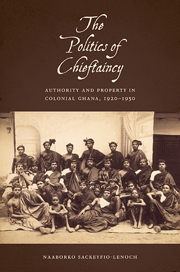Book contents
- Frontmatter
- Dedication
- Contents
- List of Illustrations
- Acknowledgments
- Abbreviations
- Introduction: Contesting Space and Authority in a Colonial Capital
- 1 Situating Ga Institutions in the European Colonial Milieu
- 2 Land Legislation, Commodification, and Effects in Accra
- 3 Negotiating Chieftaincy, the Ga Stool, and Colonial Intervention
- 4 Succession Disputes, the Ga State Council, and the Future of Chieftaincy
- 5 Contesting Property in Accra and Its Periurban Locales
- Conclusion
- Notes
- Bibliography
- Index
4 - Succession Disputes, the Ga State Council, and the Future of Chieftaincy
Published online by Cambridge University Press: 05 October 2014
- Frontmatter
- Dedication
- Contents
- List of Illustrations
- Acknowledgments
- Abbreviations
- Introduction: Contesting Space and Authority in a Colonial Capital
- 1 Situating Ga Institutions in the European Colonial Milieu
- 2 Land Legislation, Commodification, and Effects in Accra
- 3 Negotiating Chieftaincy, the Ga Stool, and Colonial Intervention
- 4 Succession Disputes, the Ga State Council, and the Future of Chieftaincy
- 5 Contesting Property in Accra and Its Periurban Locales
- Conclusion
- Notes
- Bibliography
- Index
Summary
Given the patterns of change and the entrenchment of colonial rule occurring in Accra, succession disputes became more acute in town politics. Much like destoolments, succession disputes were dynamic sites in which authority holders negotiated political change in colonial Accra. These disputes entailed conflicting interpretations of who the rightful successor to a chieftaincy stool should be, disagreements about custom and tradition, jurisdictional questions, and contested versions of ancestral and hereditary rights to political office. Moreover, claimants continually contested the status, ritual authority, lines of descent, and hierarchies of each stool. Because the rules surrounding succession resulted in multiple norms and procedures, competition for chiefly office became subject to varying yet valid interpretations. In the politics over chieftaincy, heirs apparent were not always clear and sometimes were nonexistent. Thus, the field of eligible candidates could present challenges.
All these features were present in Ga succession conflicts before the colonial era but became more salient in the twentieth-century politics of Ga chieftaincy. In nineteenth-century Accra, succession disputes permeated Ga political life, as when the ambiguity surrounding the lines of descent through which Taki Tawia had secured the stool in 1862 raised concerns about which of the three royal houses in the Abola quarter should succeed him. In this instance these problems were compounded by uncertainty regarding who was entitled to manage the stool while a suitable successor was chosen.
- Type
- Chapter
- Information
- The Politics of ChieftaincyAuthority and Property in Colonial Ghana, 1920-1950, pp. 94 - 125Publisher: Boydell & BrewerPrint publication year: 2014

